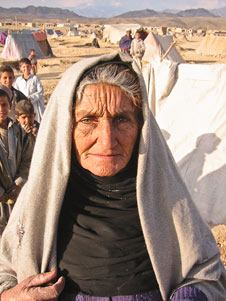Heruddin is one man who needed a tent, and there was an ocean of him. We said our goodbyes and we kept walking and found another patchwork tent dweller, a man missing a leg. We were starting to draw a crowd, and the fighter raised his Kalashnikov at the people who were asking for help. It was hard to breathe as the people pressed in. The man said his name was Farid, and that he was originally from Kunduz. "How did you lose your leg?"
"I lost it at the Kabul airport during the American bombing. I'm a tailor, and now I can't work." Farid was selling off his family's possessions to buy food, because he had no other money. A few steps away and down another tent row an older woman named Bibi Jan came out to talk to me. She said that some new tents had come in, but that they had been distributed unfairly, with all new tents going to the members of one family. I took her picture right there in the cold winter sun. After the picture, other refugees admonished her for letting her photograph be taken. "Why not," she said. "He's like my son." Where, I wanted to know as we hiked back to the car, was the UN High Commission for Refugees, why weren't they providing some basic assistance? Aman didn't know. The security guard said, "They are not here."
Looking around at the buildings and the steel signs planted in the road, I saw the names of some Arabic charities, an Austrian charity, but the relief effort looked as haphazard as the tents themselves. Charities and relief agencies in Afghanistan advertise their efforts by planting signs by the road, but there was no distinctive blue U.N. sign to be seen.
So we went on to Jalalabad, after waiting in a traffic jam caused by a mine sweeper, and found the UNHCR offices. I asked to speak to the director. We were ushered into a dark office, with walls covered by acronym-bearing signs, to meet with Hassan Mohamoud, field officer for the UNHCR. He was very nervous when Sar Shahi was mentioned. "Sar Shahi has a very long history," he began and went on to say that first off, the UNHCR isn't really supposed to do anything about Sar Shahi because they aren't refugees. I asked him what they were if they were not refugees. "They are IDPs, internally displaced persons, and the U.N. doesn't want to interfere with their right to seek asylum in another country. Technically we are not supposed to do anything. The U.N. has a clear policy about it. Also, the U.N. does not want to encourage the formation of border camps, which is what it is."
"You can't help them until they cross into Pakistan? The border is closed to refugees, and Pakistan doesn't want them." Refugee assistance is very difficult, but it seemed that there should be a solid reason why the U.N. had completely abandoned Sar Shahi. "Many of the people in the camp have political problems from the war and they are afraid of the current government," Mohamoud said. This was definitely true, but it didn't seem like a good reason to keep out of the assistance business. We talked about a few more aspects of the situation, especially the medical condition of the people there. They were sick from the cold and an inadequate diet, it was obvious to everyone.
"Nobody is starving at Sar Shahi; sometimes the refugees exaggerate." He went on to say, "Sar Shahi is actually closed. It is 10 years old and it has been closed since 1997. The U.N. has no responsibility for it." This was tantamount to saying that it wasn't there despite the obvious fact that thousands of people lived in it. Field Officer Mohamoud was so nervous, I wanted to make him feel more at ease. At one point he called in his director of policy, a woman named Monica, who pointed out the difficulties in distributing aid in a country where there is no government. That is certainly true, but the camp is a reality and it seems criminal to abandon it in the middle of winter. "You know that the residents of Sar Shahi destroyed their new water tank," Monica told me. That made so little sense to me, I suggested that someone from the outside must have done the deed. When I told her that it didn't add up she said, "No, it was definitely someone inside the camp. They did it to get the attention of the U.N."
When I left, she wouldn't tell me her last name. Those misbehaving war refugees, let
them shiver and shake.![]()
This story originally appeared in Salon.com under the same title.
 LEAD IMAGE: January 2002, Afghanistan, Sar Shahee camp. A widow named Bibi Jan explained that the refugees from the Tora Bora bombing had little food and no shelter. When I entered the camp, I discovered that no agency had made an attempt to shelter these people. The U.S. failed to kill or capture high ranking Al Qaeda members and instead relied upon Afghan forces who let them escape.
LEAD IMAGE: January 2002, Afghanistan, Sar Shahee camp. A widow named Bibi Jan explained that the refugees from the Tora Bora bombing had little food and no shelter. When I entered the camp, I discovered that no agency had made an attempt to shelter these people. The U.S. failed to kill or capture high ranking Al Qaeda members and instead relied upon Afghan forces who let them escape.Photo: Phillip Robertson
© Phillip Robertson, 2009-2014.
